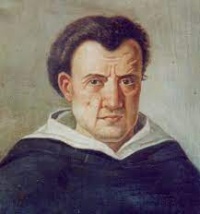Difference between revisions of "Tommaso Campanella"
From QueerBio.com
| (One intermediate revision by the same user not shown) | |||
| Line 1: | Line 1: | ||
| − | [[File: | + | [[File:campanella.jpg|200px|thumb|left|Tommaso Campanella]] |
==Country== | ==Country== | ||
| Line 15: | Line 15: | ||
==Description== | ==Description== | ||
| − | Poet, philosopher. Jailed for heresy when he opposed the theory of [[Aristotle]] in his attempt to define humanism using Catholic theology; arrested and charged with sodomy in 1593. Wrote most of his important works while jailed in Spain from 1599-1626 | + | Poet, philosopher. Jailed for heresy when he opposed the theory of [[Aristotle]] in his attempt to define humanism using Catholic theology; arrested and charged with sodomy in 1593. Wrote most of his important works while jailed in Spain from 1599-1626 after a trial found him guilty of conspiring against the Spanish rulers. After his release, he was again forced into exile, this time in France under the protection of Louis XIII. Books include Philosophia sensibus demonstrata (1592), The Monarchy of Spain (1600), Political Aphorisms (1601), Atheismus triumphatus (1605–1607), Quod reminiscetur (1606), Metaphysica (1609–1623), Theologia (1613–1624), and his most famous work, The City of the Sun (1602). |
| + | |||
| + | ==See Also== | ||
| + | |||
| + | * [[LGBTQ Philosophers and Teachers of Philosophy]] | ||
==Further Reading/Research== | ==Further Reading/Research== | ||
Latest revision as of 18:48, 9 August 2021
Country
Italy
Birth - Death
1568 - 1639
Occupation
Writer
Description
Poet, philosopher. Jailed for heresy when he opposed the theory of Aristotle in his attempt to define humanism using Catholic theology; arrested and charged with sodomy in 1593. Wrote most of his important works while jailed in Spain from 1599-1626 after a trial found him guilty of conspiring against the Spanish rulers. After his release, he was again forced into exile, this time in France under the protection of Louis XIII. Books include Philosophia sensibus demonstrata (1592), The Monarchy of Spain (1600), Political Aphorisms (1601), Atheismus triumphatus (1605–1607), Quod reminiscetur (1606), Metaphysica (1609–1623), Theologia (1613–1624), and his most famous work, The City of the Sun (1602).

